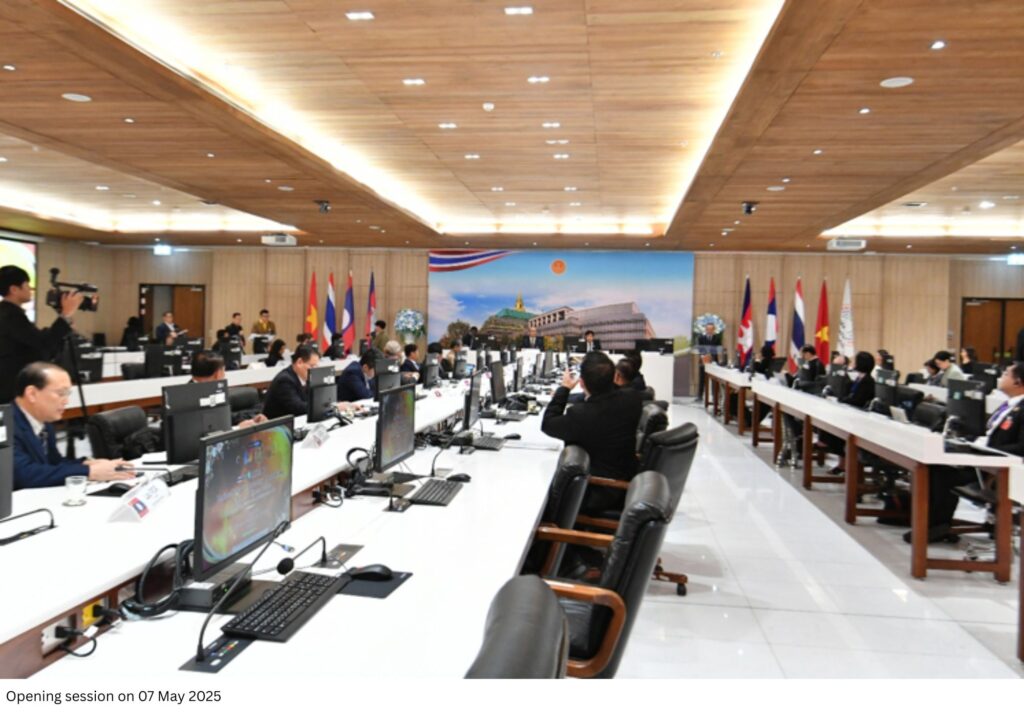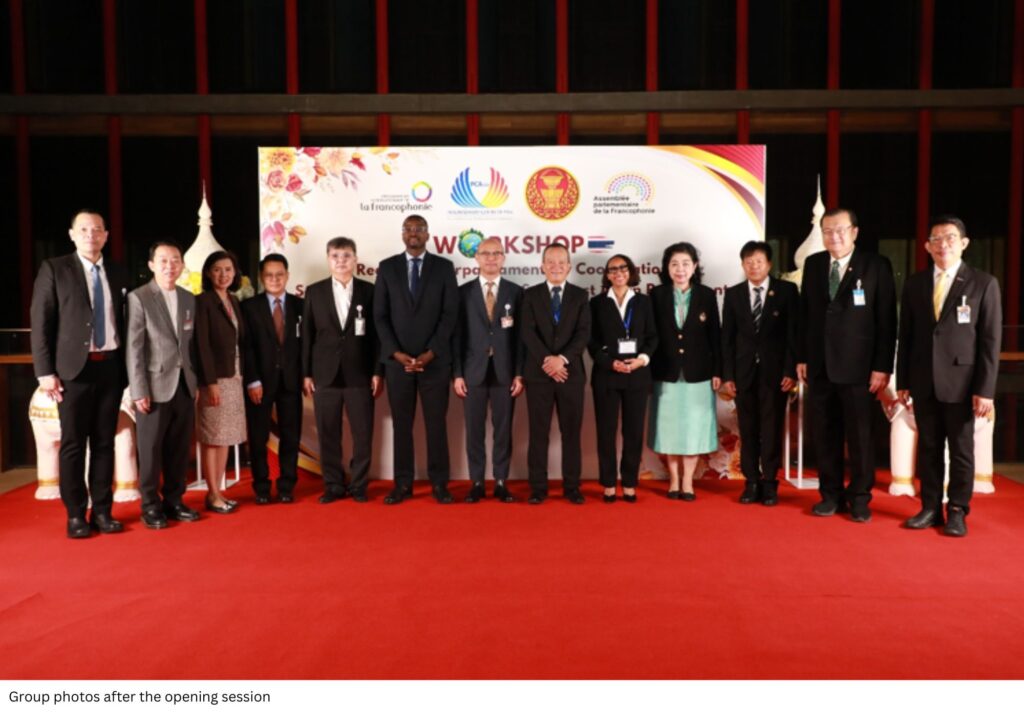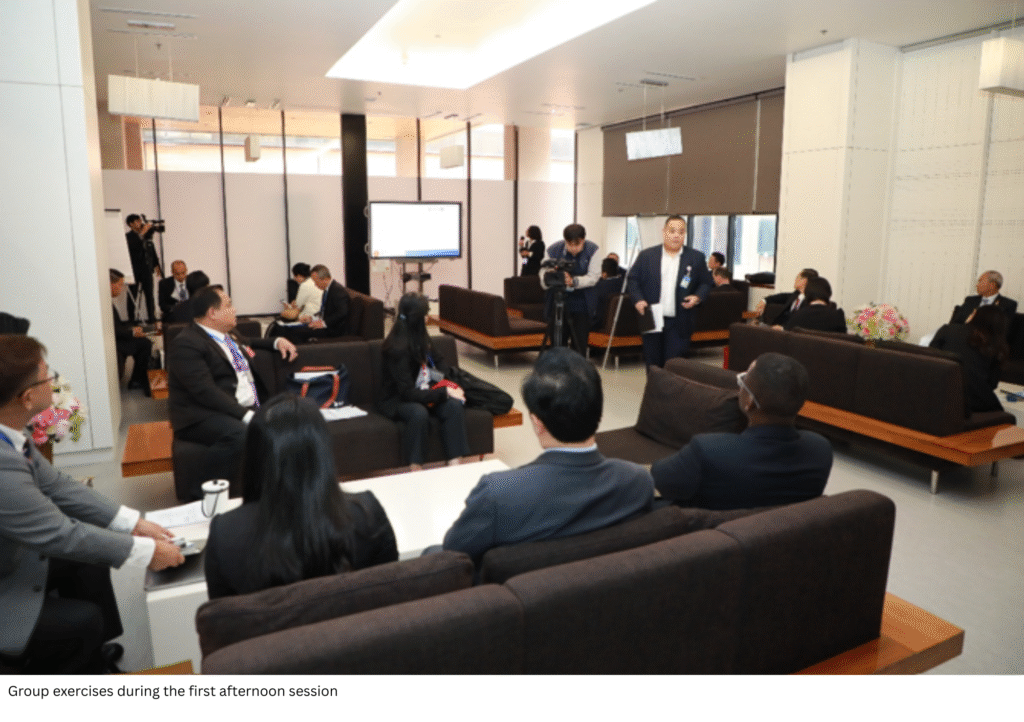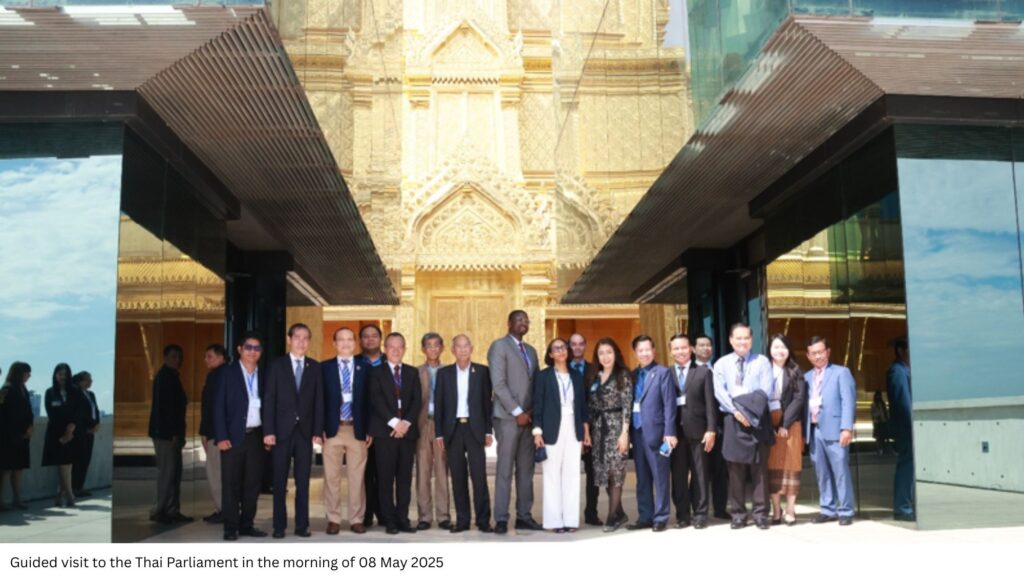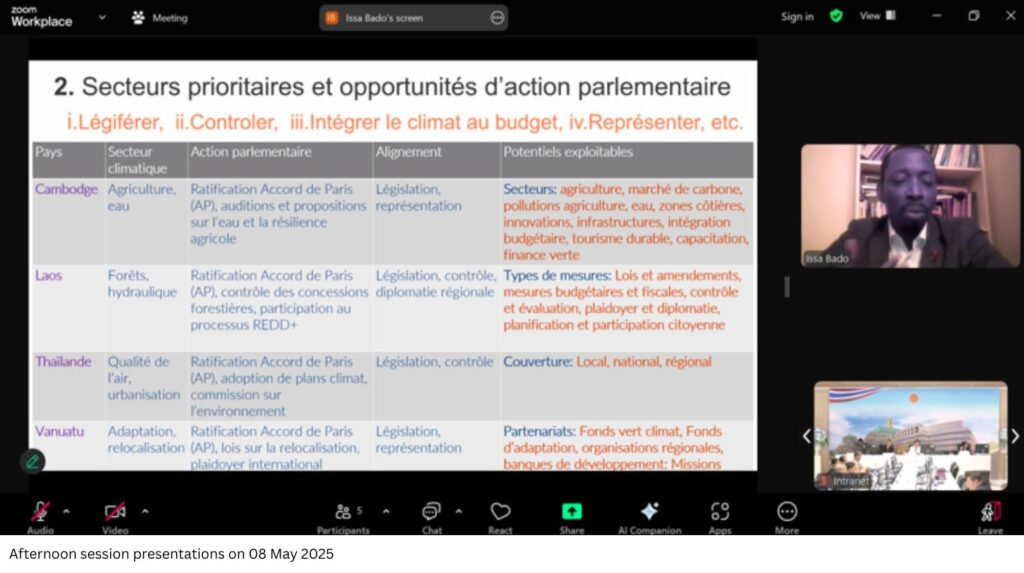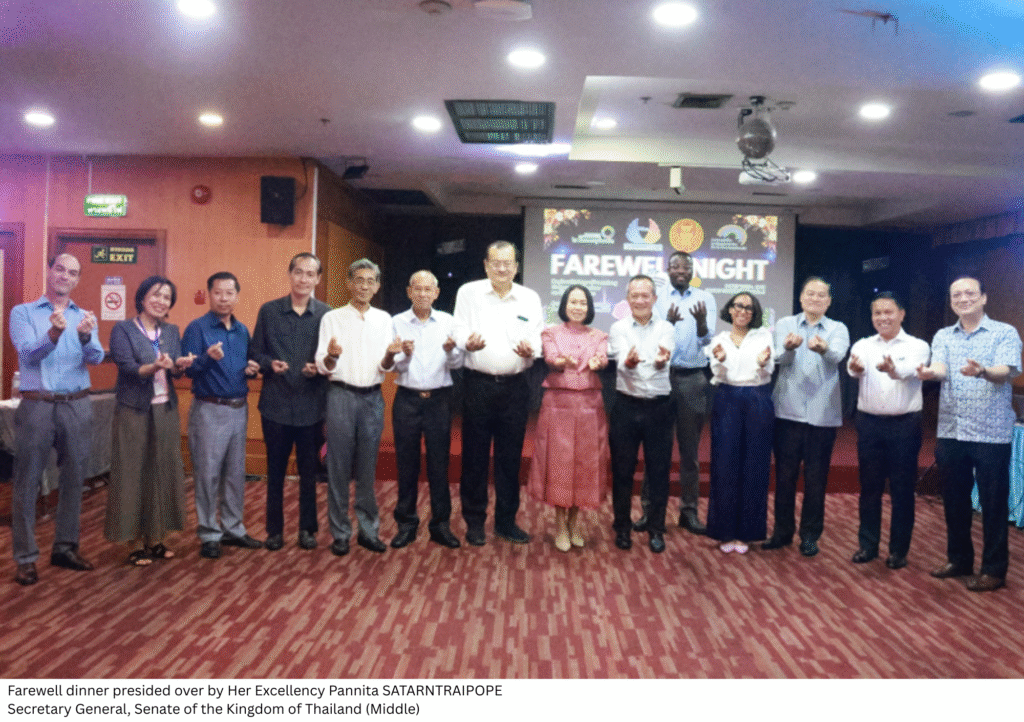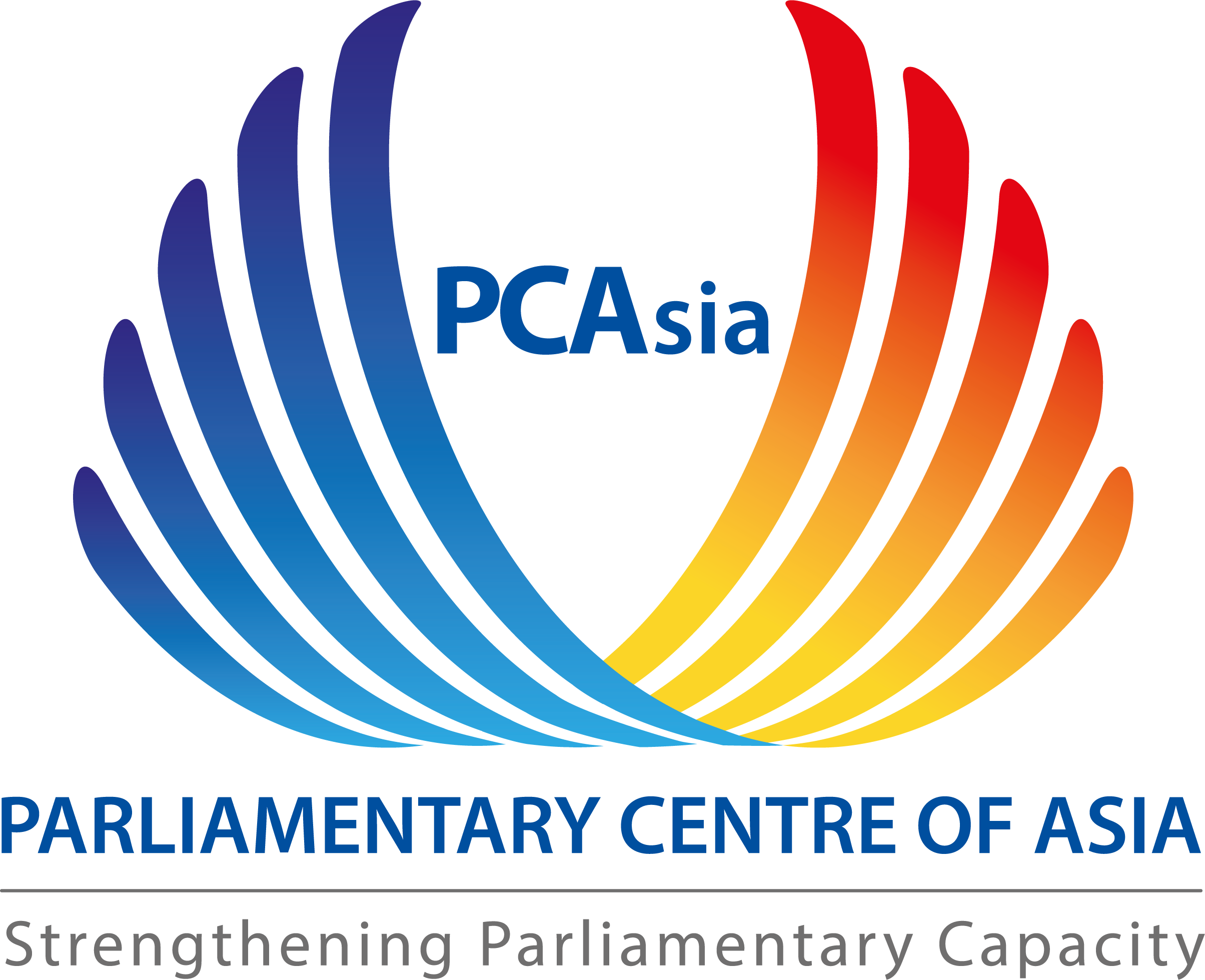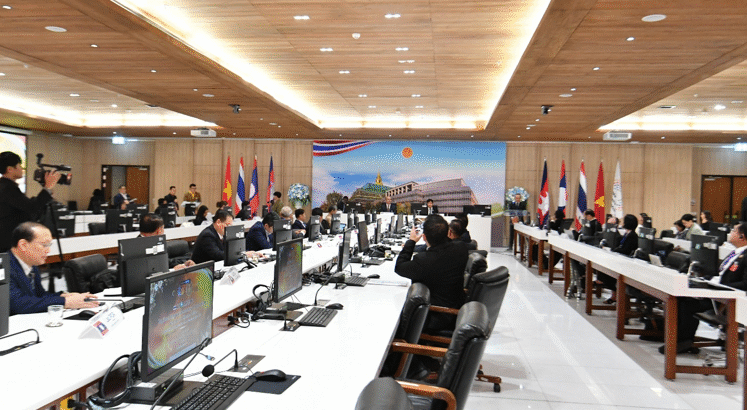Bangkok, 07-08 May 2025
Parliamentarians, parliamentary officials and climate policy experts from Cambodia, Lao PDR, Thailand, national, regional, and international partners convened at the Thai National Assembly for the Regional Interparliamentary Cooperation Seminar-Workshop on Climate Policy, co-hosted by the National Assembly of Thailand, the Parliamentary Centre of Asia (PCAsia), and the Assemblée parlementaire de la Francophonie (APF).
Held to mark the 10th anniversary of the Paris Climate Agreement, this seminar aimed to support Southeast Asian parliaments in translating national climate commitments into actionable laws. Drawing on the APF’s Climate Legislative Corpus, the event brought together legislators, experts, and civil society to share experiences, co-develop legal frameworks, and promote the integration of clean air policies into broader climate legislation.
In his welcome remarks, Acting Pol. Sub-Lt. Arpath SUKHANUNTH, Secretary General of the House of Representatives of Thailand, underscored the country’s’ commitment to environmental reform, highlighting the drafting of a Clean Air Act as a key motivation for hosting the event. PCAsia Executive Director Mr YI Chanprasnar next praised the collaboration with the Thai Parliament and APF for the co-organised event, and the importance of strengthening parliamentary capacity to help address regional and global challenges.
A message from APF General Delegate Ms Amélia LAKRAFI, delivered by Mr Alioune DRAMÉ, APF’s Advisor on Cooperation Programming in Coordination of Legislative Bodies, thanked the Thai Parliament for its commitment and expressed hope for enhanced cooperation with Assemblée parlementaire de la francophonie (APF). The remarks also acknowledged PCAsia for initiating this partnership event and thanked all delegations. The message emphasised the APF’s supporting role, and the value of its experience sharing and methodology to help parliaments address urgent climate threats.
Hon. Mr Nitipon PIWMOW, Spokesperson of the Thai House Committee on Land, Natural Resources and Environment, opened the workshop by welcoming participants and calling the event a milestone in advancing climate action. He expressed pride in co-hosting with PCAsia and APF, cited Thailand’s recent floods as a regional warning, and emphasized the role of parliaments in turning global commitments into inclusive, evidence-based national laws through continued collaboration with civil society and subject-matter specialists.
Expert sessions followed, with presentations by Dr. Madina REGNAULT, APF’s expert, who outlined the APF’s climate legislative corpus, and official Mr Kittisak PRUKKANONE, Director of Strategy and International Cooperation from the Department of Climate Change and Environment of the Thai Ministry of Natural Resources and Environment, who spoke on Thailand’s legislative progress toward emission reduction. Ms Weenarin LULITANONDA, of the Ad Hoc Committee on the Clean Air Organic Law Bill, and Green News of Thailand, addressed regional air quality challenges and the importance of co-managed, rights-based clean air legislation to improve the well-being and longevity of citizens. UN Women’s Ms Amy REGGERS, Regional Specialist on Gender and Climate Change, highlighted the gendered impacts of climate change and the role of gender-responsive legislation and budgeting in achieving the goals of the Paris Agreement and SDGs.
In a parliamentary roundtable, Members of Parliament from Thailand, Lao PDR and Cambodia shared national climate strategies and legislative priorities. Hon. Mr Pastsorn SAKORNSATHIAN, Member and Advisor from the Ad Hoc Committee on the Clean Air Bill of the House of Representatives of Thailand, explained how Thailand’s Clean Air Act, introduced in early 2024, is being consolidated from seven draft bills with the aim of reducing toxic air pollutants through reforms, data transparency, and public access. If passed, it would help enable environmental taxation, international cooperation, and stronger air quality standards. Despite challenges like policy gaps and cross-border pollution, recent improvements and community efforts show promising progress. Notably, Cambodian Senator Prince SISOWATH Thomico, Member of the Commission on Planning, Investment, Agriculture, Water Resources, Meteorology, Rural Development, and Environment of the Senate of Cambodia, pointed to his country’s ambitious Nationally Determined Contributions (NDC) targets and forest cover achievements, while Lao MP Chanthavong SENAMATMONTRY, Vice-Chairman of the Foreign Affairs Committee of the National Assembly of the Lao PDR, emphasised the urgency of fully enacting clear emissions and air quality laws. He stressed that Lao PDR has strengthened its climate governance by adopting key environmental laws aligning with UNFCCC commitments, while targeting climate adaptation across multiple sectors. Key challenges remain in data systems, coordination, enforcement, and financing.
The afternoon focused on group exercises to contribute towards model climate legislation. Facilitated by Dr. MadinaREGNAULT, participants noted achievements, recommended priorities, and proposed varied strategies to help inform draft legislation. These integrated cooperation methods and climate justice – with enforcement and funding mechanisms – each working towards adaptable and inclusive legal models for national and regional contexts.
Following a guided visit of Thailand’s new Parliament complex – the Sappaya-Sapasathan, a model of sustainable architecture – day 2 centred on climate law implementation, financing mechanisms, and stakeholder engagement, as regional lawmakers explored ways to operationalise their legislative efforts. In the session on Good Practices in Climate Governance, Hon. Mr NORNG Veasna, Member of the Commission on Planning, Investment, Agriculture, Water Resource, Meteorology, Rural Development, and Environment, of the National Assembly of Cambodia, highlighted how the country has strengthened its climate governance through legal reforms, institutional coordination, capacity building, and integration of climate targets into national development plans, while also prioritising regional cooperation to address transboundary challenges. Hon. Dr. Xaybandith RASPHONE, Vice-President of the Laotian section of APF described his country’s centralized climate implementation model, backed by over 30 national adaptation projects. Hon. Mr Kiatchai MAITRIWONG, Vice Chairman of the Senate Standing Committee on Energy, presented the Thailand Carbon Neutral Network, a private-public collaboration to support a domestic carbon market.
For the session on Parliamentary Action and Scrutiny, delegations from Cambodia, Laos, and Thailand worked in national teams to analyse their respective parliaments’ roles in scrutiny, budget tracking, and citizen engagement. Hon. Mr NORNG Veasna of Cambodia noted the challenge of limited access to technical data and the need for digitalisation and budgetary support. Hon. Prof. Dr. Viengvilay THIENGCHANHXAY, Vice-Chairman of the Justice Commission of the Lao National Assembly, highlighted the need for localised adaptation strategies in a resource-dependent society.
The next session focused on Mobilizing Climate Finance, where Mr Julien TARIS, Senior Financial Structuring Expert at the Green Climate Fund (GCF), emphasised GCF’s role in de-risking climate investments and scaling private sector finance to help countries like Cambodia and Laos turn their climate commitments into action. UNDP’s Mr Vivek MISRA, Regional PFM Expert from the UNDP Climate Finance Network, stressed how effective climate finance requires long-term planning, cooperation between legislative and executive bodies, and strong oversight to ensure accountability and transparency, as demonstrated by countries like the UK and Philippines. Mr Phubet SENBUT, Parliamentary Budget Analyst of the Parliamentary Budget Office of the House of Representatives of Thailand, next highlighted Climate Budget Tagging (CBT) as a crucial tool for improving Thailand’s climate budgeting, and addressing gaps in transparency, allocation, and coordination across ministries. He highlighted that CBT could help align budget allocations with national climate commitments, enhance fiscal transparency, and improve access to international finance.
During the Session on Stakeholder Engagement. Mr Issa BADO, specialist in international negotiation for francophone countries from L’Institut de la Francophonie pour le développement durable (IFDD), described OIF initiatives to empower youth, women, and climate negotiators, and facilitate access to global climate finance. He shared that the IFDD, with its headquarters in Quebec, Canada, and a branch in Vietnam, plays a key role in providing information and training for its member countries on climate change and other international issues. Assoc. Prof. Kanongnij SRIBUAIAM, Vice-Chairperson of the Ad Hoc Committee on the Clean Air Organics Law Bill, and Faculty of Law from Chulalongkorn University of Thailand, shared the Thai experience with a citizen-initiated Clean Air Bill, calling it a case of turning “protesters into co-drafters.” She emphasized the critical role of active citizenship in shaping Thai environmental law, using the citizen-led Clean Air Act as an example of how civil society can drive legislative change. In a short video, Hon. Mr Emile KO GUIRIEOULOU, Member of Parliament of Côte d’Ivoire, highlighted the efforts to build a regional network among African countries to collaboratively address climate change. The network, launched in September 2024, aims to improve governance, share information, and strengthen financial preparedness, with a focus on advocating for Africa’s needs in global forums like COP29 and COP30. He called for continued interregional solidarity, praising APF for enabling parliamentarians to “speak with one voice.”
Mr YI Chanprasnar, PCAsia Executive Director thanked the Thai Parliament for hosting such an important event and emphasised the vital role of legislatures in shaping and communicating climate policy. He highlighted PCAsia’s decade-long support for parliamentary capacity building and legislative improvement, as well as its role in facilitating regional dialogue. He reaffirmed PCAsia’s commitment to advancing regional cooperation and empowering parliaments to address climate change for future generations.
To close the seminar, Hon. Mr Chavaphon WATTANAVEKIN, Vice Chair of Thailand’s Senate Committee praised his colleagues from Southeast Asian parliaments and partner organisations for their constructive engagement over the two-day dialogue, emphasising the importance of robust parliamentary action on climate change. He concluded the event by urging sustained regional cooperation and legislative follow-through as Southeast Asia and the world near the 10-year mark of the Paris Agreement.
